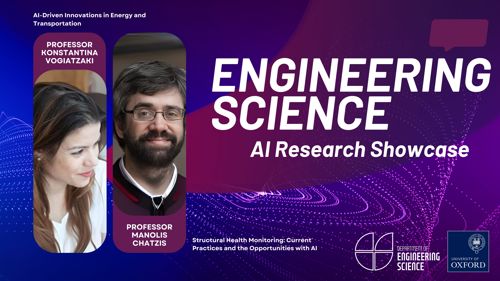29 Oct 2024
Jenkin lecture 2024: What has generative AI ever done for us?
In this year’s Jenkin lecture, Professor Ingmar Posner outlined how generative AI can be leveraged in robotics to create agents that learn to perceive and to act.

At our 2024 Jenkin lecture for Engineering Science Alumni in September, Ingmar Posner, Professor of Applied AI at the Oxford Robotics Institute (ORI) and Principal Investigator - A2I, looked at how recent developments in generative AI could improve how machines act and interact in the real world - for, with, and alongside humans.
Ingmar’s talk reviewed how generative AI can be leveraged in robotics to create agents that learn to perceive and to act. In particular, it highlighted one of the most tantalising features of these models beyond direct content creation - the ability to learn structured latent spaces.
Professor Posner leads the Applied Artificial Intelligence Lab (A2I) at Oxford University and is a Founding Director of the ORI. Ingmar's research aims to enable machines to robustly act and interact in the real world - for, with, and alongside humans. Ingmar’s expertise lies in the design of robot learning approaches for perception, action, and interaction.
Professor Posner’s lecture, which formed part of the Meeting Minds weekend of events across the University. The programme also featured a series of enlightening supporting lectures from leading academics in the Department:

- Professor Manolis Chatzis discussed ‘Structural Health Monitoring: Current Practices and the Opportunities with AI,’ focussing on how critical infrastructure such as bridges, buildings and wind turbines can be more effectively monitored for fatigue and damage through the use of sensors for assessing the status of infrastructure elements, using recently developed AI methods.
- Professor Konstantina Vogiatzaki looked at ‘AI-Driven Innovations in Energy and Transportation: From empowering traditional Computational Fluid Dynamics to improving Market Predictions,’ delving into the intersection of AI and energy, illustrating how high performance computing, machine learning techniques, and advanced Computational Fluid Dynamics (CFD) algorithms can significantly enhance system efficiency, optimize resource management, mitigate risks, and drive innovations in the next generation of energy and transportation systems’ deployment.
The lecture is a mainstay of the Department’s Alumni calendar, and this year was attended by more than 180 people.




